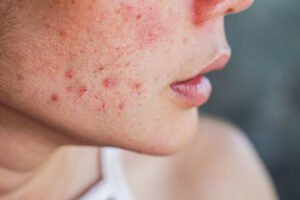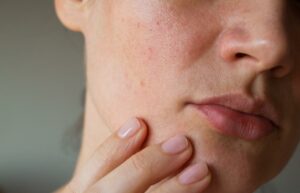Living with Polycystic Ovary Syndrome (PCOS) brings about a unique set of challenges, and one often overlooked aspect is the impact it can have on your skin. Hormonal imbalances associated with PCOS can lead to a variety of skin issues, from acne to excessive hair growth. However, with the right skincare routine and lifestyle choices, you can take control and achieve a radiant complexion. In this blog, we will delve into the world of PCOS skin care, offering insights, tips, and effective strategies to help you achieve healthy and glowing skin despite the challenges posed by PCOS.
Contents
Why PCOS Skin Care Is Important?
 PCOS, or Polycystic Ovary Syndrome, is a hormonal disorder that affects individuals assigned to females at birth. One often overlooked aspect of PCOS is its impact on the skin. Understanding why PCOS skin care is important involves recognizing the specific skin issues associated with this condition and the potential psychological and emotional toll it can take on individuals. Here are some key reasons:
PCOS, or Polycystic Ovary Syndrome, is a hormonal disorder that affects individuals assigned to females at birth. One often overlooked aspect of PCOS is its impact on the skin. Understanding why PCOS skin care is important involves recognizing the specific skin issues associated with this condition and the potential psychological and emotional toll it can take on individuals. Here are some key reasons:
- Hormonal Imbalance and Skin Issues: PCOS often leads to an overproduction of androgens, such as testosterone. This hormonal imbalance can contribute to skin problems like acne, oily skin, and increased hair growth (hirsutism).
- Acne and Self-Esteem: Hormonal acne is a common manifestation of PCOS. Acne breakouts, especially when persistent, can impact an individual’s self-esteem and confidence. Proper skincare can help manage and reduce acne, promoting a clearer complexion.
- Hyperpigmentation and Scarring: Inflammation and persistent acne can lead to hyperpigmentation and scarring. A dedicated skincare routine can address these issues, promoting a more even skin tone and minimizing the appearance of scars.
- Excessive Hair Growth (Hirsutism): Increased levels of androgens in PCOS can result in excessive hair growth in areas where males typically grow hair.
- Psychological Well-Being: Skin issues associated with PCOS can have a profound impact on mental health and emotional well-being. Persistent skin problems may lead to feelings of self-consciousness, anxiety, or even depression.
- Quality of Life: Addressing skin concerns related to PCOS is not just about appearance; it’s also about enhancing the overall quality of life. When individuals feel comfortable and confident in their skin, they are more likely to engage in social activities and maintain a positive outlook on life.
All in all, PCOS skin care is crucial for managing the visible symptoms of the condition, promoting emotional well-being, and empowering individuals to feel confident and comfortable in their skin.
What Skin Care Is Good For PCOS?
PCOS (Polycystic Ovary Syndrome) can affect the skin in various ways due to hormonal imbalances, and establishing a consistent and targeted skincare routine can help manage these issues. Here are some recommended PCOS skin care practices:
Exfoliation
Exfoliation plays a crucial role in maintaining clear and healthy skin for individuals with PCOS. By removing dead skin cells, exfoliation helps prevent pores from becoming clogged, reducing the likelihood of acne breakouts. Opt for a gentle exfoliant that contains ingredients like alpha hydroxy acids (AHAs) or beta hydroxy acids (BHAs). AHAs, such as glycolic acid, work on the skin’s surface, while BHAs, like salicylic acid, penetrate deeper into the pores. It’s important not to over-exfoliate, as this can lead to irritation and exacerbate skin issues. Limit exfoliation to 1-2 times a week to strike a balance between maintaining skin clarity and avoiding potential sensitivity.
Moisturization
Contrary to common belief, even individuals with oily or acne-prone skin associated with PCOS should use a moisturizer. Using a fragrance-free and non-comedogenic moisturizer helps maintain the skin’s natural barrier, preventing it from producing excess oil to compensate for dehydration. Opt for water-based or gel-based moisturizers that provide hydration without clogging pores. Moisturizing is essential for achieving a balanced complexion and preventing the skin from becoming overly dry, which could trigger an increase in oil production.
Sun Protection
 Sunscreen is a non-negotiable component of any skincare routine, especially for individuals with PCOS. Hormonal imbalances can make the skin more prone to hyperpigmentation, and exposure to UV rays can exacerbate this issue. Choose a broad-spectrum sunscreen with at least SPF 30, and apply it every morning, even on cloudy days. This protects the skin from harmful UV rays, prevents sun damage, and helps maintain an even skin tone. Consistent sun protection is a crucial step in managing skin concerns associated with PCOS.
Sunscreen is a non-negotiable component of any skincare routine, especially for individuals with PCOS. Hormonal imbalances can make the skin more prone to hyperpigmentation, and exposure to UV rays can exacerbate this issue. Choose a broad-spectrum sunscreen with at least SPF 30, and apply it every morning, even on cloudy days. This protects the skin from harmful UV rays, prevents sun damage, and helps maintain an even skin tone. Consistent sun protection is a crucial step in managing skin concerns associated with PCOS.
Hormone-Friendly Products
Selecting skincare products labeled as “non-comedogenic” and “oil-free” is vital for those with PCOS. Non-comedogenic products are less likely to clog pores, reducing the risk of acne breakouts. Oil-free formulations are designed to provide hydration without adding excess oil to the skin. Additionally, choosing products free from harsh chemicals and fragrances minimizes the risk of irritation. Opt for gentle cleansers, moisturizers, and makeup products that are specifically formulated to support sensitive and acne-prone skin.
Treatment for Acne
For those dealing with acne associated with PCOS, targeted treatments can be beneficial. Ingredients like benzoyl peroxide and salicylic acid have proven efficacy in managing acne. Benzoyl peroxide helps reduce acne-causing bacteria on the skin, while salicylic acid exfoliates and unclogs pores. It’s crucial to introduce these treatments gradually to avoid excessive dryness or irritation. Consider incorporating them into your evening routine, starting with a lower concentration and increasing as needed.
Nutrient-Rich Diet
The importance of a nutrient-rich diet cannot be overstated for individuals with PCOS. Consuming a balanced diet with plenty of fruits, vegetables, whole grains, and lean proteins provides essential vitamins and minerals that support overall skin health. Antioxidant-rich foods help combat oxidative stress, which can contribute to skin aging. Omega-3 fatty acids, found in fish, flaxseeds, and walnuts, are particularly beneficial for their anti-inflammatory properties, helping manage skin conditions associated with PCOS.
Hydration
Adequate hydration is fundamental for maintaining healthy skin. Drinking enough water helps keep the skin hydrated from within, supporting its elasticity and overall appearance. Proper hydration can also aid in reducing the appearance of fine lines and promoting a radiant complexion. Make it a habit to drink water throughout the day, and consider incorporating hydrating foods such as water-rich fruits and vegetables into your diet.
Stress Management
Chronic stress can exacerbate hormonal imbalances associated with PCOS and contribute to skin issues. Engage in stress-reducing activities such as yoga, meditation, or deep breathing exercises. These practices not only promote relaxation but also help balance cortisol levels, reducing the impact of stress on your skin. Prioritize self-care and find activities that bring you joy to manage stress effectively.
Regular Exercise
Regular physical activity is beneficial for hormonal balance and overall well-being. Exercise helps regulate insulin levels, which can be particularly important for individuals with PCOS. Improved circulation during exercise also promotes healthy skin. Aim for a combination of cardiovascular exercises, strength training, and activities you enjoy to make exercise a sustainable part of your routine.
Consult a Dermatologist
If you’re experiencing persistent or severe skin issues related to PCOS, seeking guidance from a dermatologist is essential. Dermatologists can provide personalized recommendations, prescribe medications when necessary, and offer professional treatments such as chemical peels or laser therapy. A dermatologist can assess your specific skin concerns and tailor a treatment plan to address them effectively.
Incorporating these practices into your lifestyle and skincare routine can contribute to managing the effects of PCOS on your skin. Remember that consistency is key, and it’s advisable to consult with healthcare professionals for personalized advice based on your unique needs and circumstances.
How Do You Clear Up PCOS Skin?
 Clearing up PCOS-affected skin involves a targeted and consistent skincare routine. In addition to the general recommendations mentioned earlier, here are specific steps to clearing up your skin:
Clearing up PCOS-affected skin involves a targeted and consistent skincare routine. In addition to the general recommendations mentioned earlier, here are specific steps to clearing up your skin:
Washing Your Face
Choose a gentle, fragrance-free cleanser suitable for sensitive or acne-prone skin. Cleansing your face twice a day helps remove excess oil, dirt, and makeup. Avoid harsh scrubs, as these can irritate the skin and exacerbate acne. Instead, opt for a mild cleanser that maintains the skin’s natural balance without stripping away essential oils.
Clearing Up Acne
When dealing with acne associated with PCOS, incorporate targeted treatments into your routine. Consider using products containing benzoyl peroxide or salicylic acid, which can help reduce inflammation and unclog pores. Start with lower concentrations to minimize the risk of dryness or irritation. Spot treatments with these ingredients can be applied directly to blemishes for more focused care.
Makeup Removal
Use a gentle makeup remover or micellar water to effectively remove makeup without irritating it. Avoid harsh rubbing, especially around sensitive areas. Double cleansing, which involves using a gentle cleanser after makeup removal, ensures that all traces of makeup and impurities are thoroughly removed. Look for makeup products labeled as non-comedogenic to minimize the risk of clogging pores.
Hydration After Cleansing
After washing your face, apply a fragrance-free and non-comedogenic moisturizer. Even if your skin tends to be oily, moisturizing is essential to prevent it from producing excess oil in response to dehydration. Choose a lightweight, hydrating formula that won’t clog pores but provides adequate moisture to keep your skin balanced.
Overnight Spot Treatment
For targeted care of acne spots, consider using an overnight treatment containing ingredients like benzoyl peroxide or salicylic acid. These treatments work while you sleep to reduce inflammation and promote the healing of blemishes. Be cautious with concentrations to prevent excessive dryness, and only use these treatments as needed.
Makeup Selection
Choose makeup products specifically designed for sensitive or acne-prone skin. Look for foundations, concealers, and powders labeled as non-comedogenic to avoid clogging pores. Mineral makeup can be a good option, as it is often less likely to irritate the skin. Remember to remove makeup thoroughly at the end of the day to prevent pore congestion.
Consistency and patience are key when establishing a skincare routine for PCOS-affected skin. Tailor your routine to your individual needs and be mindful of how your skin responds to different products. If you encounter persistent challenges, seeking professional advice from a dermatologist can help you navigate the specific complexities of managing skin concerns associated with PCOS.
Conclusion
In conclusion, managing PCOS skin care involves a thoughtful and consistent approach. By choosing gentle cleansers, targeted acne treatments, and non-comedogenic products, individuals can address specific skin challenges associated with hormonal imbalances. Prioritizing hydration, sun protection, and a nutrient-rich diet contribute to overall skin health. Incorporating stress management, regular exercise, and consulting a dermatologist when needed complete a comprehensive strategy.
Remember, everyone’s skin is unique. So finding the right routine may take time. With patience and personalized care, individuals with PCOS can enhance their skin health, boost confidence, and embrace a radiant complexion. If you are facing PCOS-related issues, PCOS treatment at HerMantra can help. Book your free trial online pcos treatment session now.


